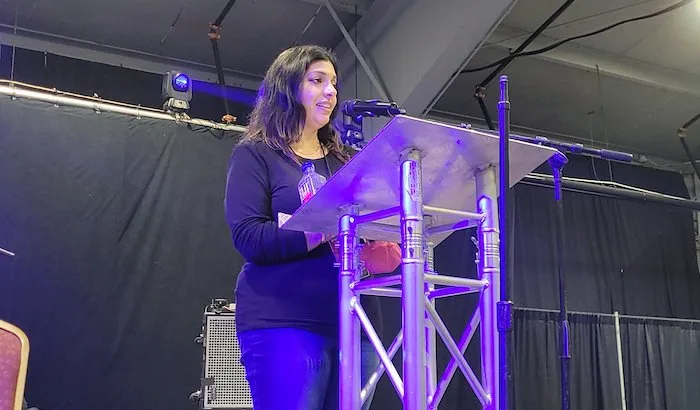
Former Massachusetts regulator Shaleen Title says the move to legalize cannabis federally is “a political half-cocked unexamined idea that looks like it might be good … But the consequences have not been looked at.”
In Massachusetts cannabis circles as well as in the wider world of weed and particularly pot policy, Shaleen Title hardly needs an introduction. She’s been putting work in as a prominent industry attorney, reformer, and advocate for more than a decade, and served as a commissioner of the Cannabis Control Commission from 2017 to 2020.
Title currently runs the Parabola Center, a “group of attorneys with the collective goal to keep the power of cannabis policy with the people.” But back in her days working for the state, she stayed away from events that pushed boundaries. So walking out on stage at the HighLifeStyle Show in Boxborough last week, where people were allowed to smoke inside, she was excited to see a private social consumption event unfold before her eyes.
“I have never been to an event like this of this scale in Massachusetts before,” Title said, “so it feels very special. And it feels like what we need to preserve.” It was the perfect launching point for her keynote about federal legalization. She continued: “It’s important to come to things like this and remember what we’re fighting for. My typical speech at marijuana events is about how we deserve better, because it’s usually in a conference hall and there’s no smoking allowed and there are a lot of serious business people, but looking around, this is about right.”
It was the first time that Title spoke on this topic in this kind of forum, and her words are food for deep thought as news about legalization and possible rescheduling breaks weekly, if not daily. We excerpted key parts of her speech below.
On social consumption …
A lot of people don’t know this, but in 2017 we actually did pass social consumption in Massachusetts. It was the most wide-ranging social consumption regulatory framework ever passed, probably; it would have allowed for restaurants, comedy shows, massages, art—marijuana to be used in any business. And after it passed, there was a massive pushback. The governor [Charlie Baker], who had appointed me, had to get involved and get the draft changed. And it was all scrapped and started over. And right now [regulators and stakeholders] are in the middle of that process.
Since leaving the CCC …
I have decided to look at federal legalization and rapid corporate consolidation. Interstate commerce and companies that are already in the legal drug trade [will bring], in my opinion, an almost immediate end to this culture that we have here.
Two years ago, I started the Parabola Center for Law and Policy and it combined two ideas—the idea that we should all be free to use cannabis without criminal penalties, and the other is that we shouldn’t have two or three corporations in charge of our lives and in charge of the marijuana industry. So we’re creating a road map to get there.
On federal rescheduling …
We are focused on telling people that the same bills that the movement is working on are being pushed by Amazon, by Philip Morris, by Reynolds American, potentially by big pharma. And they don’t have any intentional protections for craft cannabis or for small business. This is the point that we wanted to get across and we wanted to let people know that if we just flipped the switch on legalization, we could potentially lose this culture that we all know and love. Two years ago, it was something that we saw coming but we didn’t know when—it was kind of a luxury that we could afford to ignore, in that federal legalization was maybe something that’s coming but we don’t know when.
But then, something happened last month which I would consider to be, if you care about this, an emergency. On Labor Day weekend, news dropped that the Biden administration is likely to change the federal schedule status of marijuana. Under the Controlled Substances Act, marijuana is currently Scheduled 1, which means that it has no accepted medical use. … The lowest one, Schedule 5, might be like cough syrup behind the counter. None of these capture a plant like cannabis, none of them capture the way that we’re used to buying cannabis, where you go to a dispensary and you buy it. Those are not scheduled. So this was largely described as a step in the right direction, though not enough, but it’s more like a step in a very bizarre direction that fully contradicts the way that we use marijuana.
On potential pitfalls …
It’s a completely unprecedented situation. We have never before had a Schedule 3 substance that didn’t first go through FDA approval and trials, and we have never had an FDA approved scheduled substance that is used as an intoxicant and a medicine at the same time. Why does this matter? Imagine if we were having this event for ketamine use or steroid use. What do we think the federal government would do? We have absolutely no idea, and that is a problem.
The other reasons I think this has gone unexamined, it’s my opinion that [rescheduling] is not being pushed by anyone in particular, but it’s a political half-cocked unexamined idea that looks like it might be good, that it might placate and pacify the cannabis community and get some votes before an election. But the consequences of it to all of us have not been looked at.
[Another reason that it has not been looked at] is that it comes with a massive tax break for marijuana businesses because of a specific law called 280E that would be reversed. It would actually keep a lot of small businesses from going out of business because their tax rate would become better. Large corporations would also get a massive tax break—we don’t know what they’ll do with those funds, but that’s the other reason that this has been applauded and not looked at in terms of what the consequences could be.
What’s next …
I’m interviewing experts, law professors, anyone who might be able to give some sense of what would come next and the consistent answer is that we don’t know. We don’t know what the federal government is going to do, we don’t know what the DEA is going to do, we don’t know what the FDA is going to do. Not a lot of people know this, but under the federal Food, Drug, and Cosmetic Act, they have a right to enforce criminal penalties. None of these things are being enforced now, but what if we inadvertently hand an $80 billion industry to pharmaceutical companies that can legally go through a path of FDA approval and trials. It takes billions of dollars in 10 years, so it’s not going to happen tomorrow, but what would that mean for the rest of us?
We no longer have the luxury to ignore this, and we need to use our collective power just like we did with medical marijuana. What we need is all of us who care about small cannabis and craft cannabis to really think about where we are using our dollars and our voices. … It’s very important that we’re at least intentional about knowing where our products come from and that we go out of our way to support Massachusetts businesses.
Check out the Parabola Center’s anti-monopoly toolkit here
























